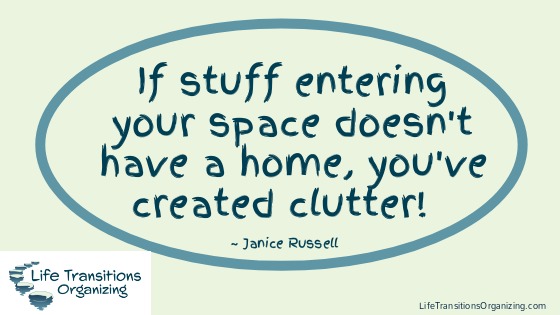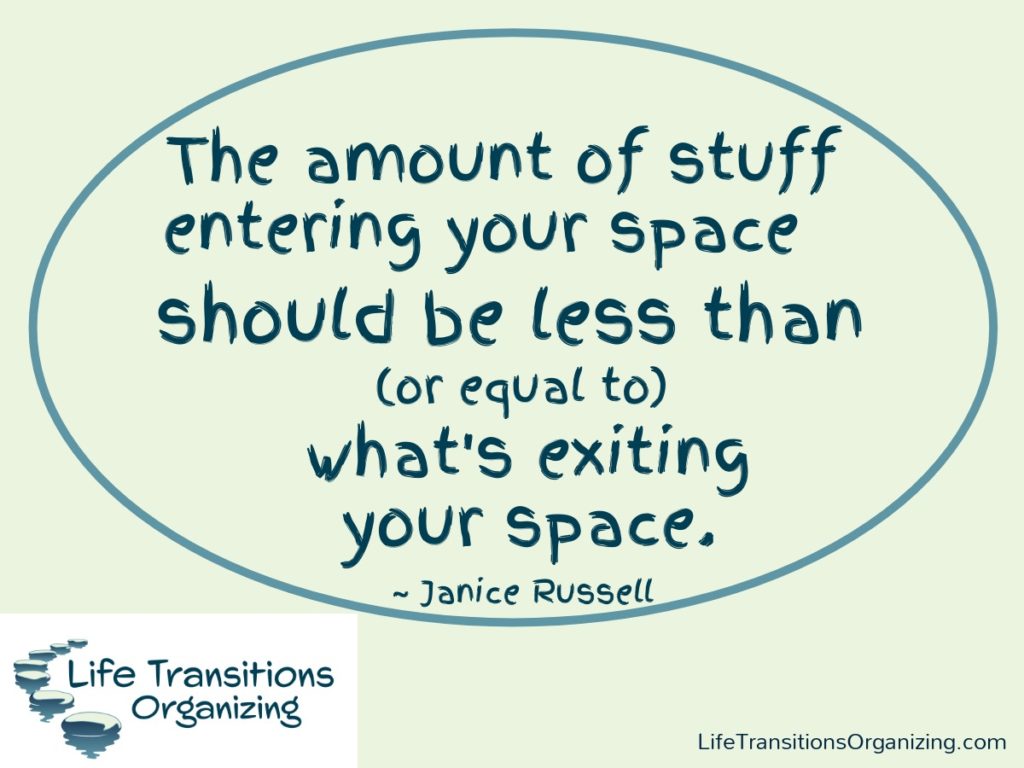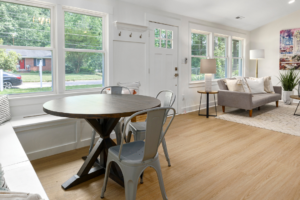
5 Tactics to Stay Ahead of “Clutter Creep”
Has this happened to you? One day your space seems manageable and the next day…poof, there’s a big pile of stuff.
Stuff is stealthy. It creeps up on you when you aren’t paying attention!
It happens when you:
- haven’t identified locations and/or containers in your space for your items
- don’t put objects away after you’ve finished using them
- purchase something for which you know you don’t have space
- only need one of something yet you see “a deal” and buy multiples
- {put your reason here}
While the accumulation of stuff may be stealthy, the results are anything but!
Once you realize that you are overwhelmed by stuff, the impact is immediate and costly. Stuff-overwhelm leads to stress, sleeplessness, panic, and often more purchases since you can’t find what you need so you re-purchase it.
How costly is it? You spend money on items you don’t need. You lose time you could be enjoying with family or friends because you have to “find something.”
And if your space overwhelms you when life is going pretty well, imagine what happens when a life-disrupting situation comes along!
You compound the issue when you say, “the clutter bothers me; I’ll take care of it later.”
The problem is that “later” is always in the future, so things rarely change.
Remember Jessie Potter’s adage, “If you always do what you’ve always done, you always get what you’ve always gotten.”
So how can we decrease stuff-overwhelm? By taking away the stealth factor! Be more intentional. Announce that excess stuff isn’t welcome anymore.

Here are five tactics:
Change Your Self-talk.
- “If I take the time to put this away now, I will be able to find it when I need it.”
- “I know this is a good deal, but I really don’t need <two black t-shirts>.”
Ask the Hard Questions.
- “Where will I put this if I buy it?”
- “When would I use a second <fill in the item>?”
Know Your Flow. “Flow” implies movement. And while you’re probably pretty good at allowing items to flow into your space. You may not be as intentional about objects flowing out of your home or office. Remember: the amount of stuff entering your space should be less than (or equal to) what’s exiting your space. As such, it’s critical to have a system for items being deleted (donated, recycled, consigned, etc.).
Develop Meaningful Habits. Did you know that your brain is happier when it has patterns to follow? It’s true! If you put your keys, purse, briefcase, bags of purchases, mail, etc. in the same places every time your enter your home, your brain doesn’t have to think…it just does it. And it is thrilled!
So when you have routines for processing snail mail, doing laundry (including putting it away!), jotting down information (and finding it later), etc., it’s easier to avoid stuff-overwhelm. Remember: if stuff entering your space doesn’t have a home, you’ve created clutter!
Set the Time. Unless you love decluttering and organizing, you won’t do it without scheduling a time to do so. You might be surprised how much you can accomplish in short bursts of time!
Organizing your office is a large project. Organizing one square-foot of your desk is a small task towards that larger goal.
I hear you saying, “just when do you think I have time to do all that?”
Rest assured: I’m not suggesting that you do all five strategies simultaneously! Start with a couple of tiny changes.
One idea is to employ one or two new actions each month:
Month 1: Ask the hard questions and designate one container for items to be donated. As you see stuff you can delete, put them into your donation bin.
Month 2: Continue Month 1 strategies. Start changing your self-talk so that it’s easier to add items to your donation bin. Create a recycle space, specifically for items that aren’t collected by your city.
Month 3: Spend five minutes a day either decluttering or organizing. Think one small unit, such as a drawer or shelf. Continue what you started in Months 1 and 2.
If this approach doesn’t appeal to you, there are other methods. Or maybe you’re just having a little trouble getting started. Call or text – 919.467.7058 – and we can discuss how to take you far away from “clutter creep.”
Tag:ADHD, anxiety, autoimmune disease, brain based disorders, clutter creep, decluttering, depression, Flow, Jessie Potter, life disrupting situations, life transitions, Life Transitions Organizing, Life Transitions Resources, life-disrupting situation, organizing, productivity and organizing professional, professional organizer, stuff overwhelm, TBI, Transition Success Program


